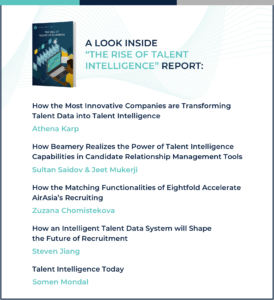Historically hiring has been reactive, tactical, and siloed. Job requisitions are opened, job posts are posted, and companies then work through a volume of job applications to try and select the individuals that are best qualified and will add the most value to the organization. The mechanisms and processes used to sort and make decisions around talent are bespoke and varied; some companies use assessments, others rely on structured interviews, many use college and years of experience as heuristics, while some have no structured process in place at all.
The Rise of Talent Intelligence
In the past couple of years, we have seen the rise of an emerging breed of tools. These tools combine the vast quantities of data that lives in companies’ hiring systems as well as the open web to enable companies to make better strategic decisions around hiring and managing talent. We are calling the solutions in this emerging category, “Talent Intelligence.”
What is the rise of #TalentIntelligence and how can you leverage this data to create actionable change in your company? @TalentTechLabs has all the details for you in their latest report: Click To TweetSome Talent Intelligence tools are optimized to provide big picture insights, such as which markets have more female software engineers or whether your pay rates are below market (potentially handicapping your talent acquisition efforts). Other Talent Intelligence tools provide a rich view at the individual talent level, answering questions such as which candidates are most likely to succeed in a role, or which high-performing internal employees might also be a high potential flight risk.
The earliest examples of Talent Intelligence came from matching technology providers; our initial thinking around these tools was that Talent Intelligence was “Matching 2.0.” That said, we are seeing companies build talent intelligence capabilities across the ecosystem, from LinkedIn via its Talent Insights offering to the Social Search tools and CRM vendors featured in our latest Trends Report The Rise of Talent Intelligence.
The Latest Trends Report
The Rise of Talent Intelligence addresses how today’s leading recruiting functions are making use of significant data to empower their decision-making. Our Trends Report brings to light the use of Talent Intelligence tools and reveals how these solutions can enhance decisions throughout all hiring phases. The report uncovers pain points such as making sense of a high volume of data from multiple sources and systems.
The Trends Report begins with a case study from HiredScore, an enterprise Matching System, about how they helped Intel increase the number of “decisions per day” by turning disparate data into intelligence. The case study highlights key metrics that provide a real-life glimpse into Talent Intelligence tools’ impact.

We then hear from Beamery, one of the leading Candidate Relationship Management Systems (CRM) about its efforts and investments to leverage Talent Intelligence in the context of a corporate recruitment marketing automation platform. CRMs are one of the core technologies used to recruit and re-engage passive talent, and given the plethora of data and systems integrations these tools possess, Talent Intelligence is a natural area of expansion.
The third contributor in the Trends Report is AirAsia, the largest airline in Malaysia and one of the leading airlines in the Asia Pacific region. The company has transformed its business over the course of the pandemic while maintaining its legacy operations. This article discusses how AirAsia was able to enter new markets and hire for roles outside its traditional centers of excellence. AirAsia continues to innovate while driving operational efficiencies in the core business by leveraging Eightfold.ai’s Talent Intelligence capabilities.
In @TalentTechLabs latest trends report they break down #TalentIntelligence and how organizations can leverage this #data for success: Click To TweetNext, the founder of Hiretual, a tool that has mapped more than 750 million candidate profiles globally, discusses the building blocks and implications of talent data systems, and how to architect an ideal recruitment infrastructure.
Finally, we end our exploration of the Talent Intelligence tools space with an article from Ideal, a matching platform, about the validated use cases and impact of Talent Intelligence tools. Ideal’s article concludes with a discussion on the risk of leaving talent decisions to AI.

